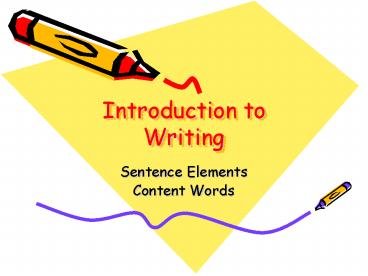Introduction to Writing - PowerPoint PPT Presentation
1 / 30
Title:
Introduction to Writing
Description:
... Code, Puerto Rico), concrete (car, dirt, clouds) and abstract (love, ... 3. Iraq, Lebanon, and Israel are in the news. 4. War causes death and destruction. ... – PowerPoint PPT presentation
Number of Views:21
Avg rating:3.0/5.0
Title: Introduction to Writing
1
Introduction to Writing
- Sentence Elements
- Content Words
2
What is writing?
- In its simplest form, it is putting down in
graphic form (symbols) something which can be
spoken - As a process, writing involves the transferring
of ideas from the mind to paper
3
Activity 1
- Reorder these words to express logical ideas
- act writing is isolated not an
- Writing is not an isolated act.
- communication an part is writing
important of - Writing is an important part of communication.
- be course can this interesting
- This course can be interesting!
4
When we combine words in a definite order to
express an idea, we form sentences.
- The idea in a sentence is expressed in the
subject-predicate relationship. In this
relationship there are specific words that give
meaning to the sentence. These words are called
content words (or parts of speech).
5
The content words are
- Nouns
- Verbs
- Adjectives and
- Adverbs
6
Nouns
- Nouns are name words. They name people, places,
actions, and ideas. Nouns can be common (man,
book, country), proper (Pedro, The DaVinci Code,
Puerto Rico), concrete (car, dirt, clouds) and
abstract (love, peace, happiness).
7
Activity 2
- Identify the nouns in these sentences
- 1. Marco visited the zoo in Mayagüez.
- 2. His sister fed the monkeys.
- 3. Iraq, Lebanon, and Israel are in the news.
- 4. War causes death and destruction.
- 5. A good Christian believes in truth, love,
and honesty.
8
- Marco visited the zoo in Mayagüez.
- Marco visited the zoo in Mayagüez.
- 2. His sister fed the monkeys.
- His sister fed the monkeys.
- 3. Iraq, Lebanon, and Israel are in the news.
- Iraq, Lebanon, and Israel are in the news.
- 4. War causes death and destruction.
- War causes death and destruction.
- 5. A good Christian believes in truth, love,
and honesty. - A good Christian believes in truth, love,
and honesty.
9
Activity 3
- Complete the following sentences with an
appropriate noun. - The ___ is very good.
- There is some ___ in the ___.
- Do you have an ___?
- ___ is taking her ___ to the ____.
10
Adjectives
- Adjectives tell something about nouns. They
describe or give further information about the
noun, such as size, quality, color, or age. - Examples
- The red dress is expensive.
- Were watching an unusual program.
11
Activity 4
- Complete these sentences with meaningful
adjectives. - Kristel is an ____ person.
- This ___ story is ____.
- The mans face is ____.
- Barbara looks ____.
12
Verbs
- Verbs tell us about the subject. Action verbs
are used to describe the behavior or action of
someone or something. The action can be physical
or mental or be related to the senses. - Examples Mike runs every day.
- I thought about the problem.
- This material feels soft.
13
- A different kind of verb, a stative, introduces a
state or condition of the subject. - Examples John is happy.
- Carlos seems upset.
14
Activity 5
- Identify the verbs in these sentences
- I drove to San Juan for a meeting.
- I drove to San Juan for a meeting.
- 2. Please call me before you go home.
- Please call me before you go home.
- 3. What do you think the answer is?
- What do you think the answer is?
- 4. What smells so awful?
- What smells so awful?
15
Adverbs
- Adverbs tell something about verbs, adjectives,
or other adverbs. They give information such as
frequency (always, often, never), manner
(quietly, fast..), place (here, there),time
(now, today, yesterday) and intensity (very,
too, so)
16
- Look at these examples
- Luis drives fast. (manner)
- We always eat here. (frequency/place)
- They dont sing very well. (intensity/manner)
- Sharon is too sick to take the test. (intensity)
17
Activity 6
- Choose the correct adjective or adverb to
complete each sentence - I dont speak English (fluent/fluently).
- My mother has (complete/completely) trust in me.
- You dance very (good/well).
- You are a (good/well) person.
- Please wait (patient/patiently) outside.
18
Activity 7 The Diamantes Poem-Getting
Creative!!!
- Each group will be assigned a picture.
- Following the directions, create a Diamantes poem
for each picture using content words. Remember
content words have meaning so be creative!
19
The Diamantes Poem Directions
- On line 1, write a common noun depicted in or
associated with the picture. - On line 2, write two adjectives describing that
noun. - On line 3, write three action verbs that can be
associated with that noun. - On line 4, write two adjectives that are the
opposite of line 2. - On line 5, write a noun that is a synonym or can
be associated with line 1.
20
- Your poem will look like this
- Noun
- Adjective Adjective
- Verb Verb Verb
- Adjective Adjective
- Noun
21
Group 1
22
Group 2
23
Group 3
24
Group 4
25
Group 5
26
Group 6
27
Group 7
28
Group 8
29
Group 9
30
Group 1
Group 7
Group 4
Group 2
Group 8
Group 5
Group 9
Group 3
Group 6

